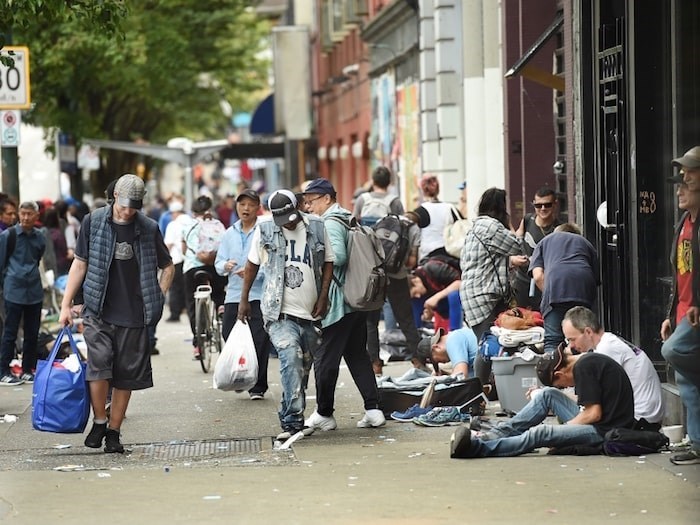Mayor Kennedy Stewart says a program for people with severe mental health and substance use challenges has operated in Vancouver for the past year and it has led to fewer hospital visits, police calls and drug dependence among participants.
The mayor said Vancouver Coastal Health has embedded services in two undisclosed city-owned buildings that include psychiatrists, psychologists and medical doctors.
The pilot program involves 30 beds spread over the two housing facilities.
“The results have been remarkable,” Stewart said Tuesday. “So way fewer ER visits, way fewer police calls, big health improvements, stabilization, way less acting out and less drug and alcohol use. So it really is working.”
The mayor said the program has essentially extended the care a person would receive at a hospital to where that person lives. He described the approach as “very intense homecare” and said it has operated for about a year.
Stewart expects data on the program, including costs, will be shared with the public, but couldn't say when.
'Catch-and-release cycle'
The mayor discussed the program the same day that a B.C. coalition of 13 mayors — which includes Stewart — renewed its plea for the B.C. government to provide “complex care” housing and solutions for the province’s most vulnerable people.
It’s a category of people living with a mental illness, a severe drug addiction, or both. Some have brain injuries. Such a combination of complex needs often means a person can’t fit into current supportive housing models in B.C. and ends up on the streets.
And, as the coalition pointed out in its news release, if that person commits a crime, they will not fit within “the overloaded justice system which perpetuates a catch-and-release cycle.”
Stewart estimated “thousands” of people in Vancouver alone are in need of care and housing.
B.C. Centre for Disease Control data from 2015 estimated there were 8,500 injection drug users in Vancouver. Between 2014 and 2020, Vancouver police arrested an average of 2,900 people per year under the Mental Health Act.
Stewart noted the pilot program is a hopeful sign and that it could be a path forward for Vancouver and other cities. That is the reason for the renewed push for more housing and supports for people across the province with complex needs, he said.
“Not all health authorities are doing this investment across the province,” the mayor said. “So really this [renewed plea] is to say, ‘Hey, it's working here. We need way more beds, and we definitely need more health authorities to get on board.’”
'Bad for business'
The push from the 13 mayors in February 2021 was focused more on the need for housing, but has shifted to include supports embedded in existing housing, some of it purchased over the past two years by cities, the provincial government, the federal government, or a combination.
Stewart and other mayors have acknowledged the impetus for the campaign is also connected to local retailers, restaurants and hotels — already hit hard by the COVID-19 pandemic — who have complained about erratic behaviour, open drug use, crime and theft occurring outside their place of business.
Broken windows to businesses in Vancouver’s downtown core are a frequent occurrence. Police Chief Adam Palmer has also spoken out about an increase in random assaults on people and aggressive shoplifters.
“When you see somebody on the street, there's kind of two reactions in the city — one, is the compassionate side that says you’ve got to help that person,” Stewart said.
“The other is this person is bad for business. I'm definitely in the first category. But in the end, whatever reason that you have for wanting change, the solution is the same, and I think that the solution is complex care.”
Victoria Mayor Lisa Helps said the renewed plea for solutions underscores the urgent need to fund programs and housing. Helps and other mayors have met regularly with Attorney General David Eby, who is responsible for housing, and Sheila Malcolmson, B.C.’s Minister of Mental Health and Addictions, to share their concerns.
“We know there's funding in the 2021-2022 budget because Minister Malcolmson called us right after the budget and said, ‘Don't worry, we know you didn't see complex care spelled out in there, but it's in the contingency,’” she said.
“It has been almost a year later since our initial call, and we are just doing this one final last push saying just please make this announcement. And please get the solutions implemented across urban British Columbia.”
The non-partisan group of mayors are from Abbotsford, Burnaby, Coquitlam, Kamloops, Kelowna, Nanaimo, New Westminster, Prince George, Richmond, Saanich, Surrey, Vancouver and Victoria.
Minister to make announcement next week
Malcolmson told Vancouver Is Awesome in an emailed statement that she plans to announce next week the “initial phase of complex care housing” in B.C. The minister said the mayors have done “good work on this critical issue” and that she was grateful for their advice.
“Our communities’ most vulnerable people – those with the most complex health, mental health, and substance use challenges – need a level of support that goes beyond what the current model of supportive housing can provide,” Malcolmson said.
“That’s why we are urgently acting to build a first-of-its-kind complex care housing system to fill this gap. It’s a priority of the Premier’s and of my ministry. Complex care housing — as we have always said —will be phased in across the province and is an important step in building the system of mental health and addictions care that people need.”
@Howellings





